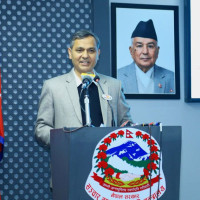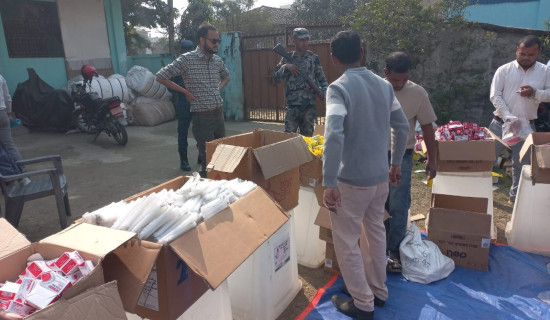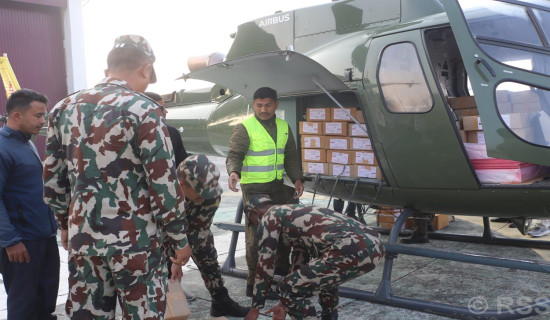- Thursday, 26 February 2026
Governance Of Economic Life
Dev Raj Dahal,
Economic society, such as agriculture, industries, business chambers, service sectors, producers and consumers associations, and cooperatives, is a key lifeline to fulfill basic necessities. It symbolizes the market transaction and is licensed by the state to do a profit, pay taxes and undertake social works in the spirit of fair business practices of conscience shuva lav. Elinor Ostrom says, “No market can survive without extensive public goods provided by governmental agencies.
No government can be efficient and equitable without considerable inputs from citizens.” The peaceful pursuit of economic life cannot be delinked from the integrity of ecology, society, politics, and the apt use of resources. Incentives for economic actors do exist to utilize land, labor, capital, technology, and knowledge relative to their virtual costs and benefits.
Flourishing economic life needs a system of property rights, contract enforcement, rule of law, competition rules, transport, information, and conflict easing means to keep supply-demand equilibrium.
Equality and social inclusion are back in the vision of Nepal’s constitution presuming redistributive measures of diffusing prosperity across social strata. High inequality and social exclusion bear negative impacts on productivity, education, health, and social mobility.
Public goods
Normally, decisions of the public economy are made by political leaders. Even private economic action has attendant effects on public policies of the government. The market fosters efficiency, the agility to fight, not equality and the free will of people. It is good at satisfying private wants, not public goods such as nature, education, health, security, rule of law, culture and infrastructure. It rewards those who can vie in market transactions, not those who are powerless and dispossessed seeking care from the government and protection from the state. But politics provides equal vote to people, the right to organize and engage in collective bargaining for wage increases, shape public policies, and grasp the loyalty of society.
The inability of Nepali leadership to live up to the party and constitutional ideals made them vulnerable to climate change, dysfunctional globalization, national capability deficits in meeting the needs of the poor, economic stagnation, and coy social security. Nepal’s market is spatially segmented, not integrating and articulating to each other and widening the economy of scale. Corporate balance sheets hardly place adequate value on the nation’s natural resources. The addiction for profits has weakened ecological resilience and destroyed nature's maze of life. Human survival rests on respect for nature, its energetic life, and self-generating ecosystems of astonishing links.
The operation of the economic and political syndicates in Nepal, however, marks the monopolistic tendencies of powerful business-oriented political elites, not the creation of an earth-caring, competitive market and easy access of ordinary people to essential goods. Owing to open border and transportation facilities, Nepali markets of Terai are articulating more to the Indian border towns than Nepali hills and mountains. Fragile infrastructural conditions have increased the costs of goods and proper integration of rural and urban areas. This has suffocating effects on the regional coherence of interests and intra-societal economic integration. The Competition Promotion, Market Protection and Consumer Protection Acts deem the practices of cartel, syndicate, and monopoly illicit.
Economic life in Nepal turns secure if power and wealth are set at balance at the end of each generation of people. The adoption of pseudo-scientific neo-liberal policies, deconstruction of the administrative basis of the Nepali state, and use of cynical postmodern projection of groups identity and group rights have disrupted the execution of constitutional visions of right to work, social justice, social protection, and equilibrium among the executive, legislative and judiciary branches of the polity.
It is unclear whether the synergy of socialist-oriented egalitarian society envisaged in the constitution is attained through the coordination of public, private and cooperative sectors when all the indicators of progress-- growth, agricultural and industrial production, current account, trade, remittance, foreign currency reserve, investment, foreign aid and tourism signify downhill path while burdens of import, debt, and inflation on the prices of essential goods uphill trail.
The contribution of tax to GDP stands at about 22 percent which is inadequate to finance a self-sufficient state. In this context, the conflicting interpretation of the nation’s economic woes by the Ministry of Finance, Nepal Rastra Bank (NRB), and National Planning Commission as evident from the seminars organised by National Economic Association and NRB on Economics and Finance does only arouse the nervousness of people at a time of local election.
The roots of economic woes are systemic yet economic policy wonks from the government and opposition have made only hard-hitting criticism of each other for adopting inept economic policy choices to address the nation’s problems of poverty, inequality, and marginalization, not a shared roadmap of progress.
Nepali policymakers so far seem far removed from the reflection of local knowledge and society, read only the farewell of the nation-state, indulged in unhealthy economic conformity, ignored macroeconomic realities, squeezed the internal labor market, and compounded the economic ills of average Nepalis forcing them to earn in a foreign land for their livelihood. It might peeve the nation’s constitutional vision of creating an independent economy rooted in a social welfare state. The policies of labor market flexibility, no work no pay and hire, and fire of workers contradict the constitutional vision of social justice.
The retreat of the Nepali state from segmental market institutions made the poor defenseless and created insecurity to the middle class - the mediating force of society - forcing it to leave the place of their origin and migrate to safer areas of developed countries while the poor in the arid part of the Gulf region as blue-collar workers. Hobbled by patronage culture, cronyism, corruption, political instability, and repulsive transition, the state is forced to take the side of the capital. Governing institutions are less robust to address post-democratic regimes and expand the productive sector of the economy parallel to constitutional promise. Leadership focus on financial capitalism marked the beginning of the crises of livelihood, economic downturn, and social struggles thus hurting the governance of economic life.
Subsidy cuts on agriculture and closure of many public enterprises and privatization of essential services, such as education, health, and public utilities for rents for Nepali leadership reflect the failure to fulfill their democratic mandate and enable the public sector to play a strategic role in infrastructure investment, production, trade creation, and trade diversification and poverty alleviation. A market economy cannot function in the absence of an institutional vision of a virtuous government, social support, and adequate regulatory measures.
Ironically, pre-mature de-agrarian nation, de-industrialization in favor of service sectors in Nepal bore worsening effects on the livelihood and compressed the process of social modernization.
The dominance of money over democracy allowed many regimes to skate back politics into the pre-democratic era and converted people into migrants, wage workers, passive voters, and consumers. Civil society, driven by charity, has to reclaim the state’s role for the public good and avert the counter-revolution of economic leaders against the egalitarian effects of democracy and exert weight for harnessing the nation’s unutilized potential-- natural resources, clean energy, culture, tourism, production, and trade diversification and bulging youth population.
Globalization has internationalized Nepal’s economic life and population and opened contact with many countries and peoples.
But in no way the benefits of globalization have been deployed in productive sectors of the economy harnessing its comparative and competitive advantages both to fulfill essential needs and diversify production, trade, and commerce. The regional and global participation of national civil society in multi-level governance criticises economic policy makers for the lack of this neglect and bypassing the spirit of the constitution yet they also ignite fresh reasons for hope from a sort of global civic rebirth articulated in the global consensus to new interest in the social charter, social movements, world social forums, global consensus on climate change and Sustainable Development Goals.
Democratic autonomy
The governance of economic life in Nepal is not irremediably determined by growth, private sector, market, polity, state, trade or technological import but by their cohesiveness with the community, compassion, wisdom, nature, and culture in a sustainable course. The universality of human rights has set the indivisibility of humanity and contributed to the emergence of regional and global public to debate and take action on infrastructural development, connectivity, participatory democracy, and economic diplomacy. There are 3.5 million shareholders of cooperatives of various types from bee-keeping, seed, and coffee to medicinal plants. Social cooperatives have the potential to boost the collective forms of capital ownership, weave together rival forces and provide citizens democratic autonomy.
But they also express the appropriation of scarce resources by powerful persons in the allocation of projects. The government and private sector have signed a memorandum of understanding (MoU) for public-private partnership for multi-layered local development aiming to assume roles in local planning, budgeting, revenue, infrastructural development, urban development, tourism, environmental promotion, health, land use, disaster preparedness, tax administration reforms, etc.
The competitive spirit of Nepali entrepreneurs, farms, and the state, however, requires strong incentives and innovation ensuring the young people are trained to become entrepreneurs in various ecological zones and utilize comparative resource advantages so as to realize the nation’s potential and attain the lofty purpose.
(Former Reader at the Department of Political Science, TU, Dahal writes on political and social issues.)















